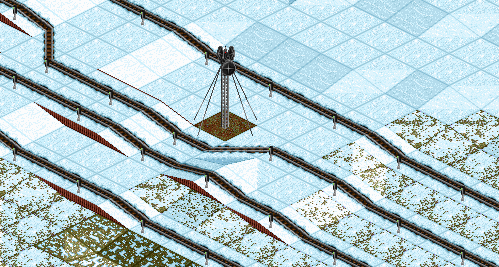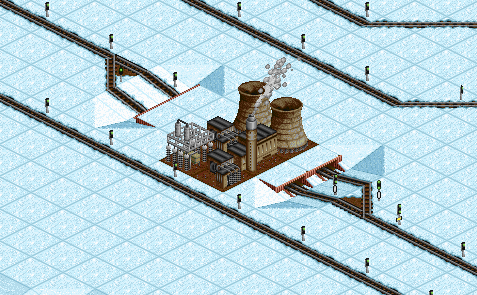Difference between revisions of "Dodging unremovables"
From #openttdcoop wiki
m (Fixed for spelling and clarity, whoever wrote the origonal needs to proofread, bad) |
(adding images to illustrate) |
||
| Line 3: | Line 3: | ||
== Going Around == | == Going Around == | ||
| − | Going around is a simple and efficient way as long as the line is not too wide and the turns aren't too short. | + | Going around is a simple and efficient way as long as the line is not too wide and the turns aren't too short. The curve around must be wide enough that trains do not slow down from encountering a tight turn, we call this curve length, or CL for short. The curve must also not force trains to change direction more than two times in the tile length, or TL for short, of the trains. Here is an example of a track curving around a transmitter antenna: |
| + | |||
| + | [[Image:dodge-around.png]] | ||
== Going under == | == Going under == | ||
| − | Going under is just as simple. Dig 2 hole's and place tunnels. Of course tunnels can't be signaled so for busy line's Multiple tunnels for every track could be required. | + | Going under is just as simple. Dig 2 hole's and place tunnels. Of course tunnels can't be signaled so for busy line's Multiple tunnels for every track could be required. Here is an example of a track using double tunnels to go under a power station, notice the track is offset on either side so the path through either tunnel is the same length, 7 straight tiles and two diagonal: |
| + | |||
| + | [[Image:dodge-under.png]] | ||
Revision as of 22:58, 8 March 2009
When building Line's it's unavoidable that you will encounter at some point an Un-Removable object such as an Antenna. There are multiple ways to avoid these and some are more effective than others. Here are a few examples:
Going Around
Going around is a simple and efficient way as long as the line is not too wide and the turns aren't too short. The curve around must be wide enough that trains do not slow down from encountering a tight turn, we call this curve length, or CL for short. The curve must also not force trains to change direction more than two times in the tile length, or TL for short, of the trains. Here is an example of a track curving around a transmitter antenna:
Going under
Going under is just as simple. Dig 2 hole's and place tunnels. Of course tunnels can't be signaled so for busy line's Multiple tunnels for every track could be required. Here is an example of a track using double tunnels to go under a power station, notice the track is offset on either side so the path through either tunnel is the same length, 7 straight tiles and two diagonal:

